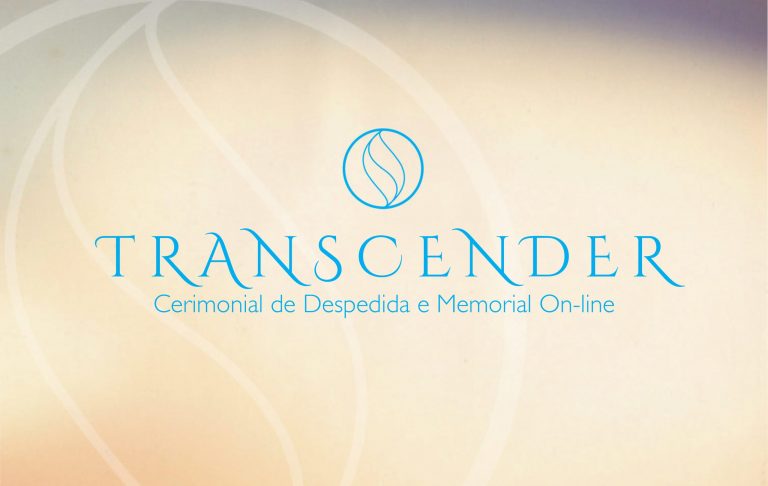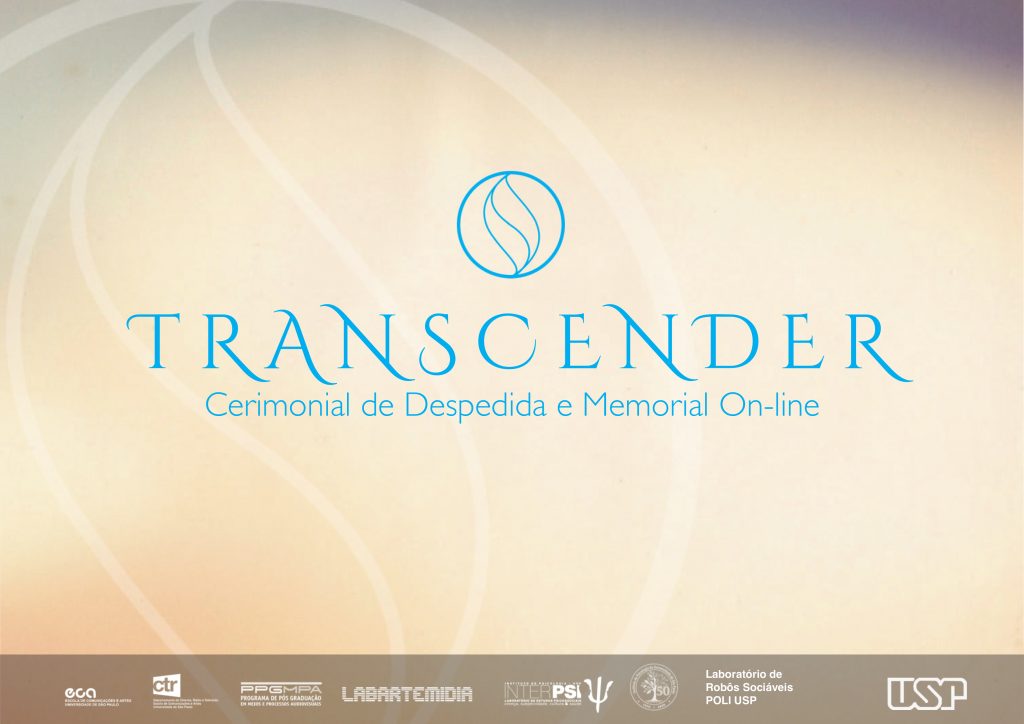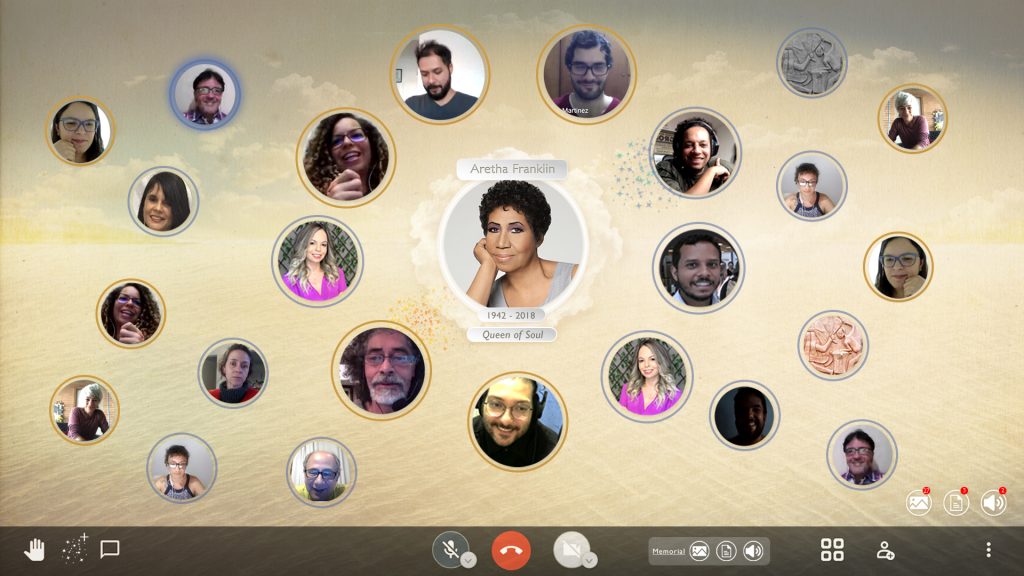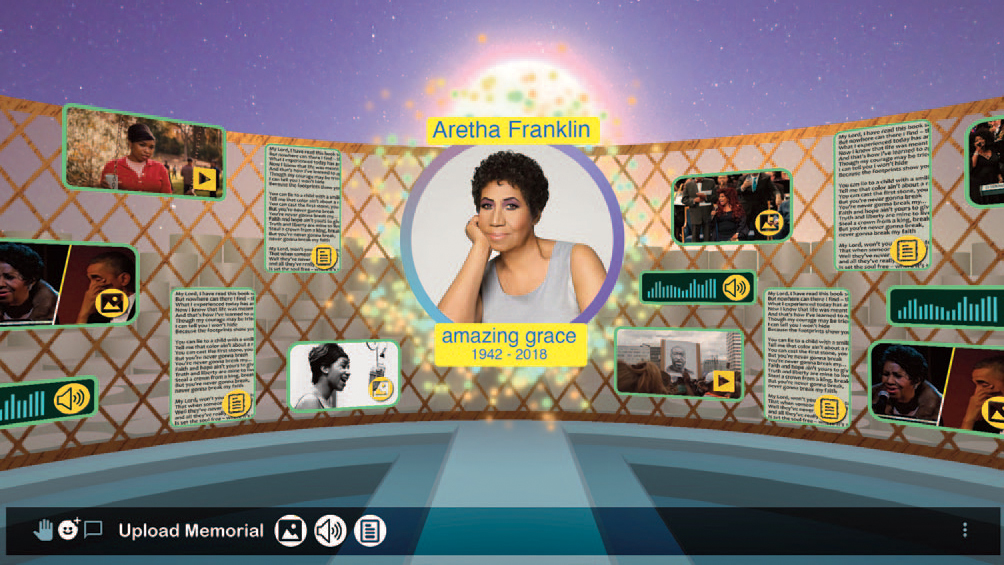
The Transcender Project is a platform under development for a Farewell Ceremony and Online Memorial. The project emerged in 2020, as reported on the LabArteMídia website, in the context of the COVID-19 crisis. In the same year, it was officially endorsed by the Pro-Rectory of Research (now the Pro-Rectory of Research and Innovation) of the University of São Paulo as one of the actions in “Lines of Research on COVID-19 at USP”, under: “Research on the new personal conditions during the pandemic (work, school, social interactions, environments, displacements, etc)”. The challenge was to find ways of dealing with death and mourning at a time when farewell rituals, present in all cultures and religions, were suspended. The transdisciplinary research aims to “understand whether tools such as TRANSCENDER can provide strategies for relieving post-traumatic stress that aim to reduce the impact of loss by reframing memories loaded with negative affect (VAZQUEZ, 2021) and reframing the trauma by altering the affect associated with the memories”.
The project emerged at LabArteMídia (Laboratory of Arts, Media and Digital Technologies) — a research group linked to the Department of Cinema, Radio and Television and the Audiovisual Media and Processes Program at ECA, through an original proposal by the group’s researcher Ph. D. Deisy Fernanda Feitosa (Post-Doctoral Fellow at Diversitas/FFLCH and currently a Post-Doctoral Fellow at CTR/ECA) and taken up by the General Coordinator Ph. D. Almir Almas (ECA/USA). Professor Almas (ECA/USP) then invited InterPsi (Laboratory of Psychosocial Studies: Belief, Subjectivity, Culture & Health) — a research group linked to the Institute of Psychology and the Laboratory of Sociable Robots, linked to the Polytechnic School – all from the University of São Paulo. The project was coordinated by Ph. D. Almir Almas, Ph. D. Deisy Fernanda Feitosa, Ph. D. Wellington Zangari (IP/USP), Ph. D. Marcos Ribeiro Pereira Barreto (POLI/USP) and Ph. D. Daniel Lima (PPGMPA/ECA/USP).
Created as applied research in the construction of a social tool to meet the demands of the Covid-19 pandemic, the Transcender project set out to be a free online platform in an immersive, customizable audiovisual environment to support the performance of farewell rituals and the recording of memorials for loved ones. Faced with the demand of how to emotionally elaborate farewells/rituals of such significance to human existence, in the face of a scenario that complicates traditional rituals, the proposed tool seeks to experiment with multiple realities (virtual, augmented and mixed) to offer technical support to the performance of these rituals at a distance, in a live immersive video solution, via streaming. In a trans disciplinary initiative, the Transcender Project encompasses communication, technology, psychology, advocacy, audiovisual and art.
The initial proposal was to expand the system, with subsequent implementations of Virtual Reality solutions in 360 video and an immersive 3D environment. Check out some images of this version below.

Cover of the project presentation, created in 2020, with the logos of the partners at that time, which have since expanded.

First model of the design of the Transcender Ceremony platform, created in the 2020 version and being improved.
Transcender – Project update
In 2022, the Transcender Project was rethought for the Metaverse, with a new breath of life, a new arrangement and new partners. In order to apply for a call for proposals from FAPESP, Almir Almas invited Prof. Gilson Schwartz and the Cidade do Conhecimento research group to join the project, which brought in other interlocutors, such as Ph. D. Marcos A. Simplicio Jr. (from the Department of Computer Engineering and Digital Systems at the Polytechnic School of the University of São Paulo POLI/USP) and USP’s international partnership with Radio Caca Foundation LTD. of Singapore and the University Blockchain Research Initiative USP, of Singapore and the University Blockchain Research Initiative (UBRI); Diversitas-FFLCH; IEA-USP; NUTAU; Museu da Pessoa and Games for Change Latin America. In particular, the international partnership brought by Professor Marcos Simplicio will allow the research to be included in the metaverse and also allow the project to gain international visibility. It will thus constitute the first action of the recently acquired Metaverso da Universidade de São Paulo, the result of USP’s partnership with UBRI and RADIO CACA.
The TRANSCENDER project begins a new phase which, in addition to the initial partnerships and co-creators of the project (ECA, Institute of Psychology, Polytechnic School), will include other researchers from the Faculty of Economics and Administration (FEA), Faculty of Law (FD), Faculty of Philosophy, Letters and Human Sciences (FFLCH), School of Arts, Sciences and Humanities (EACH), Institute for Advanced Studies (IEA), Center for Research in Architecture and Urbanism Technology (NUTAU-FAU), all from USP; and also with Museu da Pessoa, the Games for Change Latin America network, UFRJ and Unicamp.
As an applied research, the Transcender project aims to study human relationships, especially affection, in the virtual world. And, of course, mediated by innovations in communication and artistic languages and the construction of transdisciplinary collaborative networks. In the Metaverso da Universidade de São Paulo, the Transceder project aims to research the semiosis of cinematographic/audiovisual enunciation, the resignification of presence, the psychological health of the human being and the construction of memory; as well as the expansion of Communications and Arts in association with the universe of Cryptocurrencies, Blockchain, Artificial Intelligence, NFT, Internet of Things, Cloud Computing.
In order to do this, the Transcender Project is increasing its initial network, bringing more scholars from these diverse areas of the arts, audiovisual, communications, psychology, law, engineering (computing, robotics, cybersecurity, cryptography and distributed systems), economics and digital finance to the horizon of the creative industries.
With Transcender, LabArteMídia and all those involved in the project hope to expand the state of the art in the area of Communications and Arts, especially in the field of Art-Technology, Human-Computer interfaces, as well as expanding the intermedialities and transdisciplinarity of the area, especially in relation to the re-signification of human presence, the construction of memories, decentralized technologies for the exchange of computational data and the human-machine relationship, starting from the virtual.

